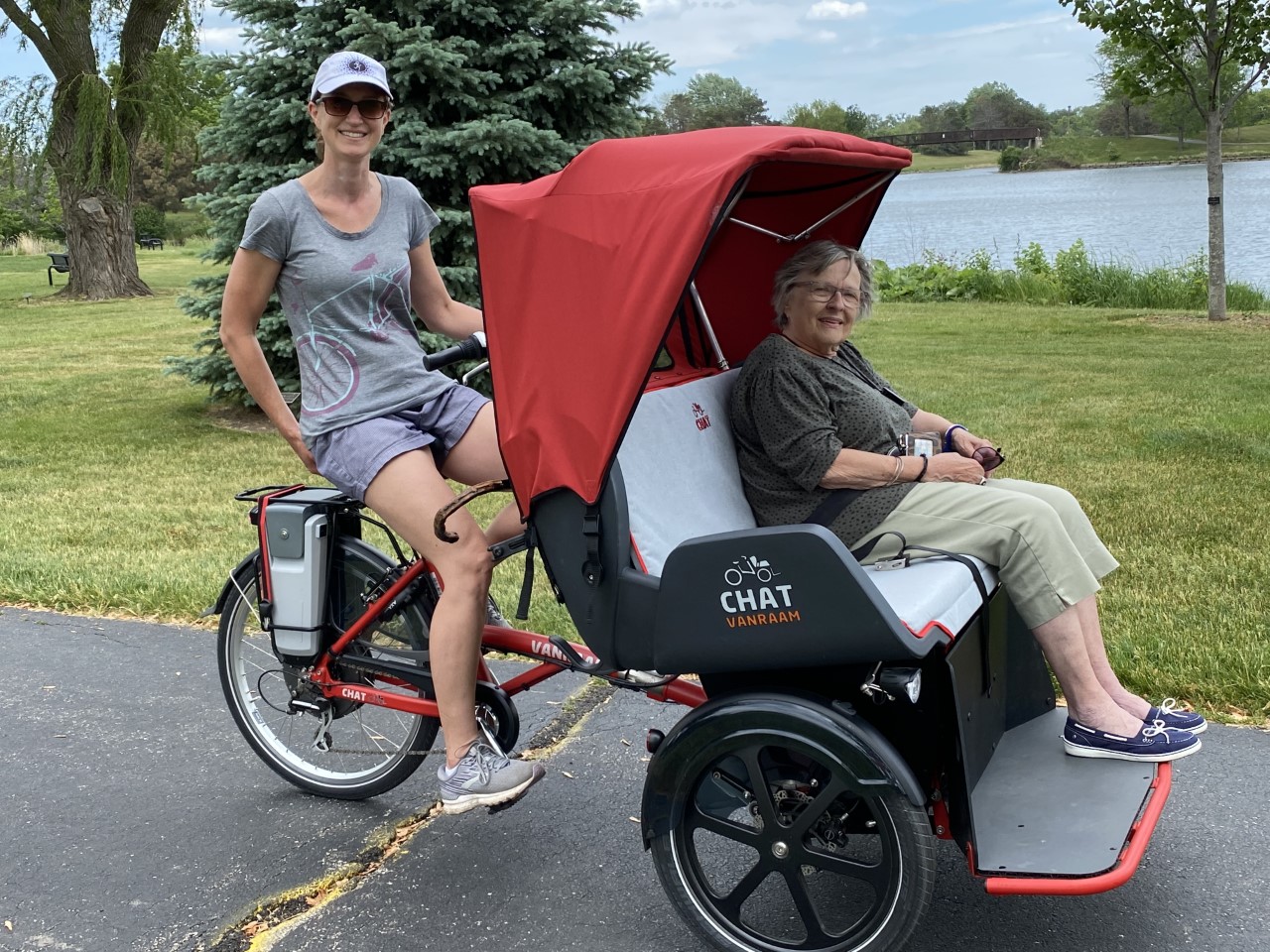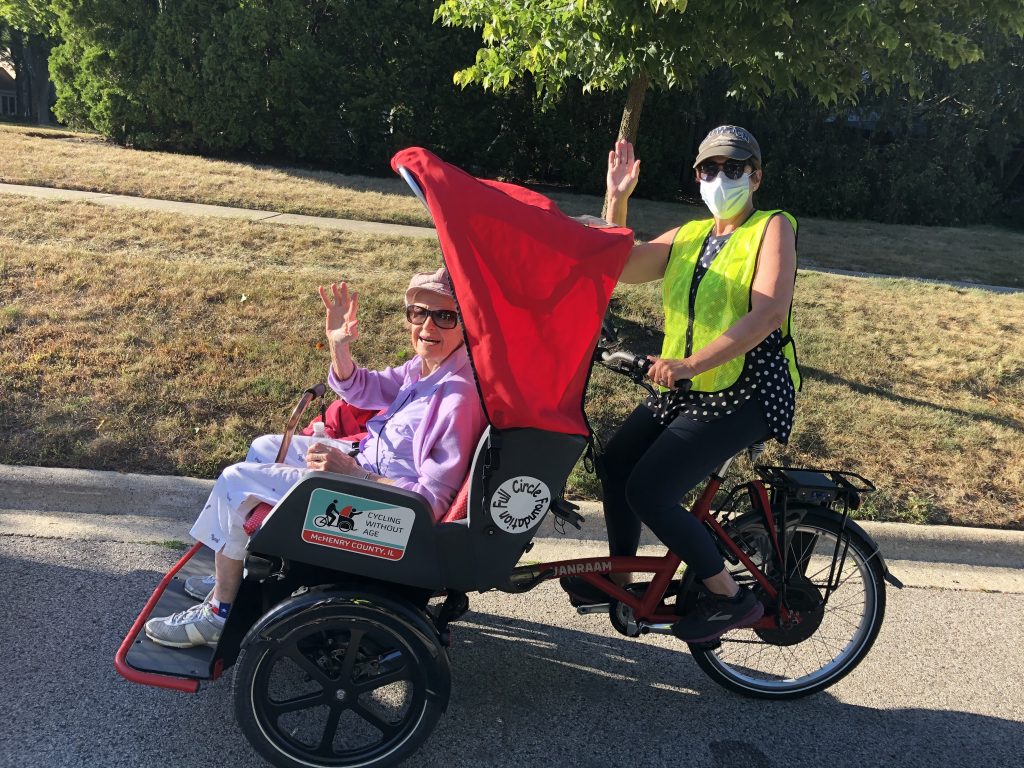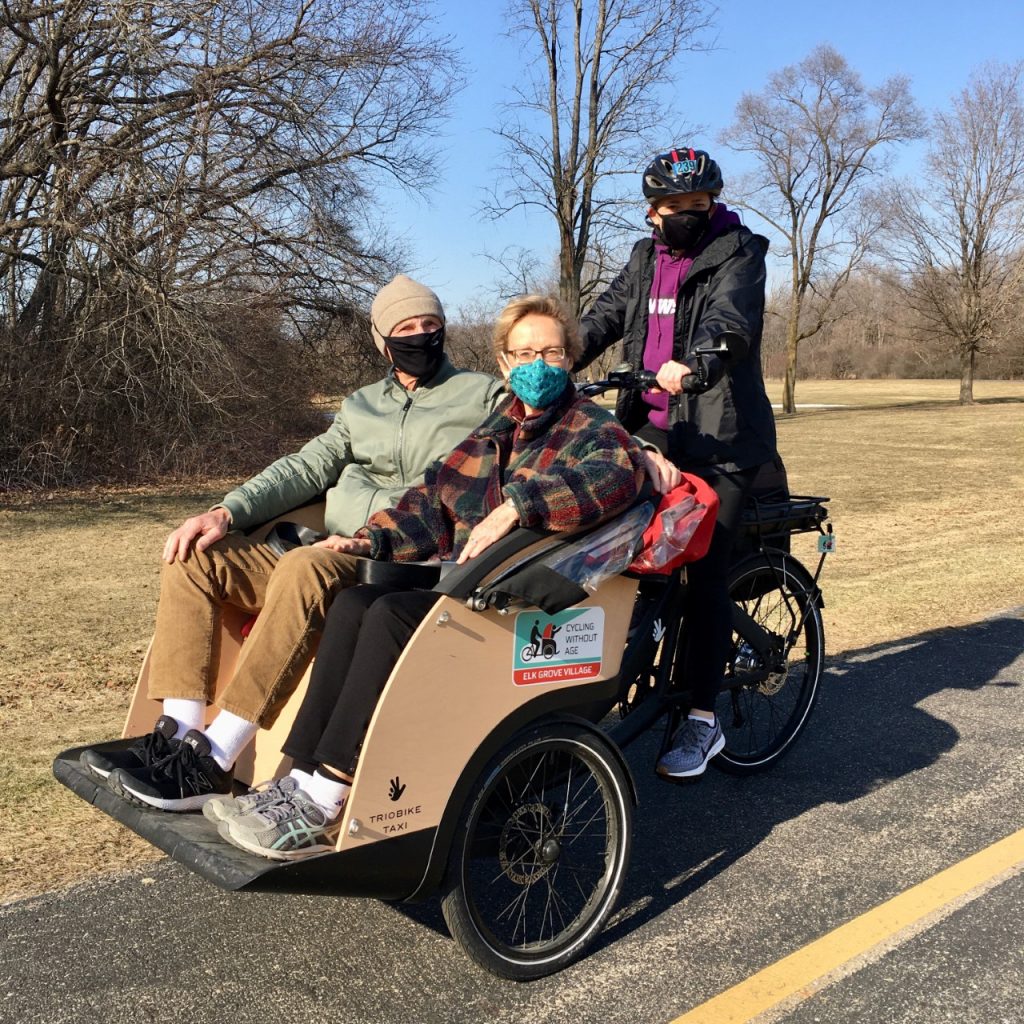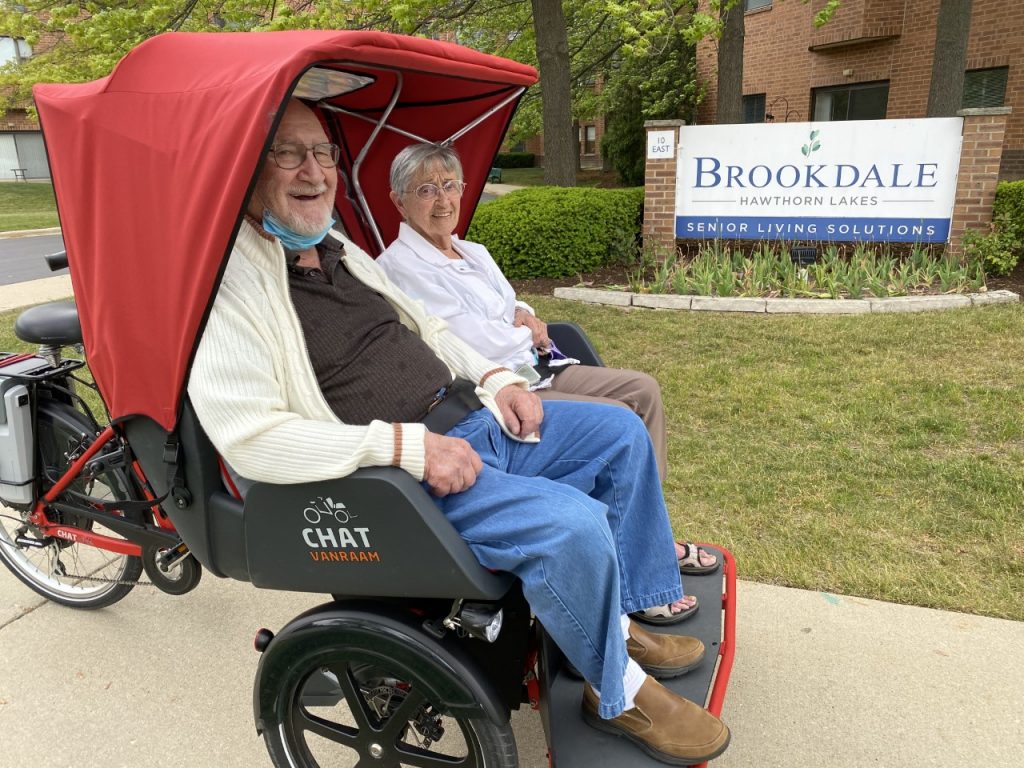Did You Know?
Cycling Without Age helps older adults combat social isolation

With the warm weather settling into Illinois, many people are hopping on their bicycles, enjoying the wind in their hair and the sun on their faces. But many older residents with limited mobility don’t often get the chance to cruise through their neighborhoods via pedal power — until now.
Cycling Without Age has made its way to Illinois to help older people reclaim the benefits of bicycling to improve their physical and emotional well-being.
Cycling Without Age is a global movement designed to combat the sedentary, lonely lifestyles of the elderly by giving them rides on trishaws, electric bicycle-like vehicles that resemble pedicabs with passenger seats in front.
Ole Kassow started the program in Denmark in 2012 when he offered free rides on a trishaw to local nursing home residents. Today more than 2,500 chapters of Cycling Without Age are in operation around the world.
MIND-BODY CONNECTION
Three of those Cycling Without Age chapters were recently established in the suburbs just outside Chicago in Elk Grove Village, McHenry County, and the North Shore region.
Each chapter provides free rides to seniors on trishaws to mitigate their social isolation and enhance their physical and mental health.
Trained volunteer pilots drive the passengers around their neighborhoods, trails, or parks at a slow, comfortable pace, allowing the passengers to share stories of their lives and engage in meaningful dialogue while getting up close with nature and connecting with members of their communities.
“Seniors are often isolated. Very rarely does somebody come to visit, and they often don’t have an opportunity to get outside,” says Greg Glover, founder of the McHenry County chapter of Cycling Without Age and president of its board of directors. “Our mission is to reduce social isolation and loneliness among older adults. It’s a need that the program beautifully fulfills because it’s a safe, gentle ride, where people can experience nature, they can get outside, they can reconnect with their community.”

“One of the benefits of Cycling Without Age is the mental benefit it provides our passengers, to make sure that they’re still active and still part of the community,” says Sarah Simmons, founder and coordinator of the Elk Grove Village chapter of Cycling Without Age. “And from a public health perspective, mental health and physical health very often go hand in hand. When we do our best to ensure the mental health of the community, we help keep its members physically strong as well.”
While Cycling Without Age has yet to conduct an impact study of its program globally, research from Cycling Without Age’s Singapore chapter finds that seniors in its program report a 19.5 percent increase in their mood and outlook on life and a 17.4 percent increase in social connectedness and community connection.
According to Barb Siegel and Deborah Goldsholl, the co-founders of the North Shore Chicago chapter of Cycling Without Age, the social interactions are at the heart of the program. “One of the great things about Cycling Without Age is that it creates community,” Siegel says. “It really allows the rider and the volunteer to communicate. It’s not just about getting out there and getting a ride on the trishaw. It’s a social activity.”
“Given the [COVID-19] pandemic this past year, there’s even more of a need for the socialization aspect of this program,” Goldsholl says. “And one of the main intents of the organization is to create that social aspect and for the riders to share their life experiences, talk about where they grew up, their background, their families.”

According to Simmons, Cycling Without Age helps to bridge the generation gap while strengthening bonds in the community, “I gave a ride to my neighbor. I’ve lived across the street from her for 20 years, but I learned so much about her that I didn’t know about — not just her previous experiences, but her family, her kids, things like that,” Simmons says. “That’s a huge part of it, too. [Cycling Without Age] connects different generations and connects people who aren’t going to probably come into contact with one another otherwise.”
In addition, the program gives pilots a respite from their busy lives while they do something positive for their communities. “They’re volunteering, but they get to slow down and actually just listen to somebody else and really connect on a personal level with an older person. It has a magical effect on the pilots as well,” Glover says.
HOW TO BUILD A CHAPTER
Getting these local chapters up and running isn’t easy. Simmons, Glover, Goldsholl, and Siegel say fundraising is vital because each trishaw costs between $10,000 and $12,000 to purchase. There’s also recurring expenses, such as maintenance and insurance.
While all three local chapters have received individual and corporate donations, the McHenry chapter obtained a local grant as well private donations.
The three chapters have applied and qualified for 501(c)(3) designations, allowing them to collect donations as tax-exempt organizations.
Another aspect of starting the chapters is marketing and outreach to sign up passengers. All four founders discovered that in-person presentations with the trishaws are crucial to help senior care facilities and others understand how the program works.
However, the COVID-19 lockdown prevented them from making many of those presentations. Glover says it’s challenging to describe the program over the phone or via email. “What sells the program is people seeing you on the trishaw,” he says. “That’s the best way to do it.”
Partnerships and collaborations are also key to the success of these Cycling Without Age chapters. For example, prior to officially launching their chapters, Goldsholl, Siegel, and Glover reached out to some of the Wisconsin chapters of Cycling Without Age for guidance about how to start and operate their chapters.

Glover also partnered with Sharon Smith of the Harvard Senior Center, which provides services, programs, and social activities for older adults in McHenry County, before launching the McHenry County chapter of Cycling Without Age. Smith continues to serve as a mentor to Glover on chapter operations, fundraising, and organizations to reach out to that would benefit from the trishaw rides. In addition, Smith connected Glover with Community Crosswalk, which initially served as the chapter’s fiscal sponsor so it could accept donations while the chapter was awaiting approval of its 501(c)(3) designation.
Simmons worked with Friends of Cycling in Elk Grove as she established the Elk Grove Village chapter of Cycling Without Age. The group continues to help her recruit volunteer pilots and let her access its network to promote the Cycling Without Age chapter with organizations like the local park district and Northwest Special Recreation Association.
Because the trishaws are extremely large and bulky, the chapters had to find suitable places to store them and an appropriate vehicle to transport them to various venues.
Simmons currently stores her trishaws in her garage, while the McHenry County and North Shore Chicago chapters store their trishaws at facilities where they provide rides. The McHenry County chapter parks its trishaw at its local park district and county conservation district facilities. The North Shore Chicago chapter stores its trishaw at the Brookdale Hawthorn Lakes assisted living center.
In addition, the McHenry County and North Shore Chicago chapters use trailers to transport their trishaws across long distances. Glover is also able to transport his trishaw on a chapter member’s extended pickup truck, a viable option that may prove useful when the chapter purchases another trishaw later this year.
While the COVID-19 pandemic limited the amount of rides the chapters could provide over the past year, they have now shifted their programs into high gear as more people are get vaccinated and restrictions ease.
They are providing rides for several senior long-term care facilities and find their ride slots booking up fast. “It’s exciting to think about doing events and getting seniors outside and doing rides,” Glover says. “That’s our biggest excitement is looking forward to giving lots of rides this year.”
_________________________________________________________
See a video presentation of Greg Glover as he shares details about starting the McHenry County Chapter of Cycling Without Age. The presentation was part of Active Trans’ Suburban Advocacy Week.
Top and bottom photos are courtesy of the North Shore chapter of Cycling Without Age; middle two photos are courtesy of McHenry County chapter (upper middle photo) and Elk Grove Village chapter (lower middle photo).
Active Trans is able to carry out its work thanks to support and donations from people like you. If you’re not a member of Active Trans, please join us. Already a member? Consider donating to ensure that this important work keeps moving forward.
Make a Donation
Your tax-deductible donation supports the important work that Active Trans does throughout the region
